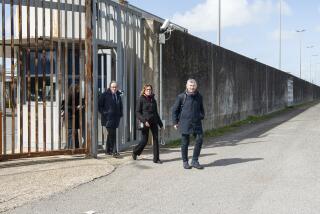Western-Leaning Ukrainian Takes the Presidential Oath
Viktor Yushchenko was sworn in Sunday as president of Ukraine, pledging to root out corruption, promote national unity and build strong ties with the rest of Europe.
The former opposition leader took his oath of office in parliament, his hand on an antique Bible. But he honored supporters by delivering his main inaugural speech in central Kiev’s Independence Square, the site of mass demonstrations late last year that helped force a rerun of fraud-marred balloting.
After a contest that saw strong support in Ukraine’s largely Russian-speaking east for his Moscow-backed rival, former Prime Minister Viktor Yanukovich, the new president said he wanted to ease regional divisions exacerbated by the bitter political campaign.
“I am president of all Ukraine,” Yushchenko told a festive crowd of about 300,000. “We cannot be divided either by the languages we speak, by the faiths we profess or by the political views we choose.”
Yushchenko’s focus on reconciliation came despite his being poisoned in September, an unsolved incident that he says was an assassination attempt by authorities. His face is disfigured with pockmarks, cysts and darkened areas as a result of what his Austrian doctors have said is dioxin poisoning. Yushchenko has said that a full investigation will determine who is responsible.
The geopolitical importance of Ukraine, and Yushchenko’s victory, was reflected in the list of visiting dignitaries, headed by seven presidents of former Soviet bloc states, nearly all of them oriented toward the West. Secretary of State Colin L. Powell traveled from Washington to demonstrate U.S. support.
The crowd cheered the appearance of Polish President Aleksander Kwasniewski, who along with other European leaders played a key role in negotiating a peaceful solution to the election crisis.
Former Czech President Vaclav Havel, the onetime dissident who led Czechoslovakia’s 1989 Velvet Revolution against communist rule, was also among the guests.
The protests in Kiev, the capital, were dubbed the Orange Revolution, a reference to Yushchenko’s campaign color. Many of those who stood for hours in subfreezing temperatures to be in the square Sunday wore orange scarves or ribbons.
Powell met privately with Yushchenko for about 40 minutes Sunday. At a joint appearance, Powell told Yushchenko, “You will continue to enjoy the full support of the American government and the American people as you move forward to undertake the efforts that the Ukrainian people are expecting.”
Partying at the square continued late into Sunday evening, with a rock concert, dancing and fireworks. Yushchenko and many foreign guests attended a more sedate inauguration concert indoors.
Russia sent a relatively low-level delegation. But Yushchenko was scheduled to travel today to Moscow to meet with President Vladimir V. Putin in an effort to repair ties frayed by the Russian leader’s open support for Yanukovich during the electoral battle.
There is widespread recognition in both Moscow and Kiev that the two neighbors, inextricably linked by history, culture and proximity, are of great importance to each other.
Outgoing President Leonid D. Kuchma, who had backed Yanukovich, appeared dejected during the official inauguration ceremony in parliament, and he was not among dignitaries at the square. Critics accuse Kuchma and his closest associates of large-scale corruption during his 10 years in power. He has also faced protests over allegations that he was implicated in the 2000 slaying of a reporter. Some observers believe he faces the risk of imprisonment.
But Kuchma has also won praise, even from some longtime opponents, for refraining from using force to install Yanukovich in power after he was declared the winner of the first runoff with Yushchenko. Some observers say Kuchma has earned the right to a peaceful retirement by presiding over a democratic transition, however reluctant his actions may have been. There have been reports that Yushchenko’s team has promised not to pursue criminal charges against him.
Yanukovich did not appear at any of the inaugural festivities. Asked why, Raisa Bogatyreva, head of his Party of Regions, replied: “He wasn’t invited.”
Yanukovich’s initial victory in Nov. 21 balloting was overturned by the Supreme Court, which ruled that electoral fraud had rendered the result invalid. Yushchenko won a Dec. 26 rematch, 52% to 44%.
In his speech at the square, Yushchenko said he hoped to bring this former Soviet republic of 48 million people into the European Union.
“Our road to the future is the road followed by united Europe,” he said. “European standards will become the norm in public life, in the economy and in Ukrainian politics.... We are no longer on the outskirts of Europe. We are in the center of Europe.”
Among the crowd was Yuzefa Semenyhyn, 76, a pensioner who served 10 years in a Soviet prison camp for helping the Ukrainian resistance after World War II. When listening to Yushchenko speak, she said, “we felt that we’re living in a free, independent and democratic country.”
“We’ve been dreaming about this country for ages,” she said.
More to Read
Start your day right
Sign up for Essential California for news, features and recommendations from the L.A. Times and beyond in your inbox six days a week.
You may occasionally receive promotional content from the Los Angeles Times.






